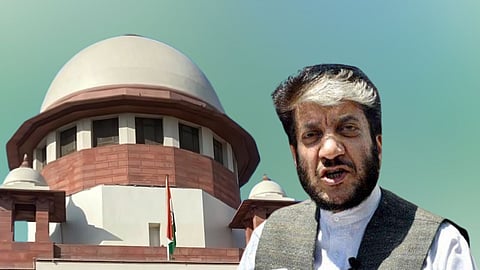

THE SUPREME COURT TODAY declined to grant interim bail to Kashmiri separatist leader Shabir Ahmed Shah in an alleged terror funding case, rejecting the plea made on the grounds of his poor health.
A bench of Justices Vikram Nath and Sandeep Mehta, while hearing Shah’s appeal against the Delhi High Court’s June 12 order, issued notice to the National Investigation Agency (‘NIA’) and sought its response within two weeks. The Court, however, made it clear that Shah would not be enlarged on bail at this stage, and posted the matter for further consideration after two weeks.
Senior Advocate Colin Gonsalves, appearing for Shah, pressed for interim bail citing serious health issues faced by the jailed separatist leader. He argued that Shah’s continued incarceration was detrimental to his condition and urged the Court to allow him temporary relief till the appeal was heard in full. The bench was unmoved and turned down the request for interim release.
The Delhi High Court, in its June 12 order, had refused to grant bail to Shah, observing that the possibility of his engaging in similar unlawful activities and influencing witnesses could not be ruled out. The High Court had also taken note of the gravity of the charges and the evidence collected during the investigation.
Shah, who has remained a prominent figure in separatist politics in the Valley, was arrested by the NIA on June 4, 2019. The case traces back to 2017 when the agency registered an FIR against 12 persons, alleging a conspiracy to raise and channel funds for carrying out activities designed to cause large-scale disruptions. The charges include financing stone pelting, damaging public property, and conspiring to wage war against the Government of India.
The NIA has maintained that Shah played a key role in mobilising funds from both domestic and cross-border sources, with the objective of fuelling unrest in Jammu and Kashmir. The agency has charged him under the Unlawful Activities (Prevention) Act (‘UAPA’) and provisions of the Indian Penal Code relating to waging war and criminal conspiracy.
While Shah’s counsel has consistently argued that the accusations are politically motivated and that his prolonged detention amounts to denial of fundamental rights, the investigating agency has pointed to his alleged track record in supporting disruptive activities.